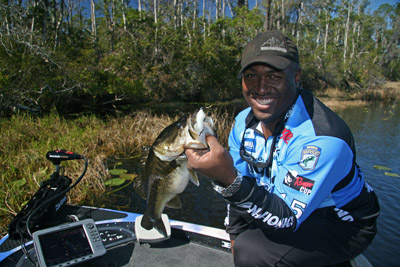Safe to say that largemouth bass have no familiarity with Jenny Craig.
The fact is that these gluttons will eat practically anything they
can catch and the bulkier the better.

Photo by David A. Brown |
The angler’s
dilemma: Many baits will tempt these fish, but dialing in most productive
one can be supremely challenging. California pro Ish Monroe does
not claim to have the definitive solution, but he knows that his
signature tactic - frogging - covers a great diversity of potential
bass meals.
“Everyone
thinks that a frog only imitates a frog - but it also imitates a
bluegill, it can imitate shad, a mouse, even a gopher,” he
said. “It imitates anything that’s in the water (or may
end up in the water) that a bass is going to eat.”
For
clarity, that gopher comment was no random muse. During a 2009 FLW
tournament out west, one of Monroe’s biggest bass spit up
a 2-ounce gopher in the livewell. Apparently, local flooding had left
the critter stranded and when he made his run for high ground, an opportunistic
bass made him lunch.
A longtime fan
of Snagproof frogs, Monroe partnered with the company to created
Ish’s PHAT Frog - an amphibian imposter with
a heavily weighted rear end that keeps the nose up, a sealed inner
chamber separate from the hook cavity and a pair of legs positioned
for maximum hook exposure. That nose-up thing, is the key to the frog’s
appeal.
“The primary reason I designed the PHAT Frog was to walk the
dog,” Monroe said. “There’s something about that
action that triggers the big fish into biting.”
And Monroe won’t hesitate to send his frog anywhere he thinks
a bass may lurk. In fact, Monroe said there’s really no wrong way
to fish a frog – except, perhaps, for open water scenarios. However,
if he’s offshore and schooling bass show themselves topside,
he’ll sling a PHAT frog there way and do the walking deal. Elsewhere,
he’ll skip it under docks, run it along rip-rap banks and squeeze
it under overhanging limbs.
“I catch fish 12 months out of the year on a frog,” Monroe
said. “You’re not going to be able to catch them 12 months
out of the year in the same location, but somewhere you can catch them
on a frog.”
Essential to this
premise is the understanding that, while cover certainly matters,
food is equally important. In a nutshell, Monroe said he’ll
throw the frog anywhere he locates baitfish.
“March through October, bass will follow bait schools, which
position near food sources like bugs and algae,” he said. “Overhanging
limbs, docks, rip rap walls – they all have shade and algae and
bugs for baitfish to eat.
“All the same scenarios are applicable eight months out of the
year and the only time it changes is during the November through February
period. During the fall-winter months, the fish are relating to the
baitfish, but the baitfish aren’t relating to the algae, they’re
moving into areas for warmer water, like the backs of creeks.”
Monroe throws his PHAT friend on a 7-foot, 4-inch Ish model Daiwa
XBD Frog Rod. Offering plenty of backbone for separating a fish from
cover, the rod also has a good tip for skipping and walking the dog.
Monroe pairs this with a 6:1 Daiwa Zillion reel loaded with 70-pound
Daiwa Samauri braid.
“The thing about frog fishing is that it’s one rod, one
reel, one presentation 80 percent of the time. It’s a lot easier
than people make it,” Monroe said.
About
the author: David A. Brown is an
award-winning wordsmith with more than 20 years of professional
writing experience. Formally educated and trained in traditional journalism,
David has honed his natural writing skills to laser-sharpness and mastered
the elements of editing and proofreading. For
more information on David A. Brown, visit his website TightWords.com

